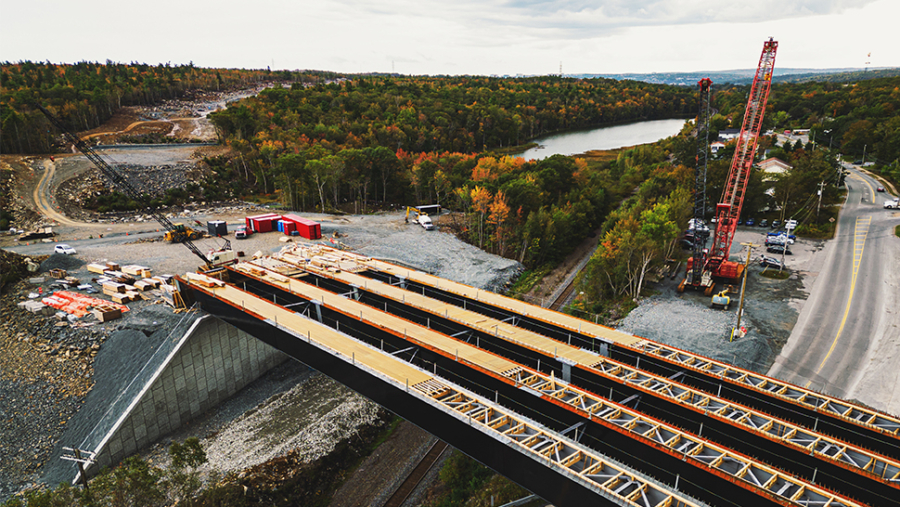
What are your compensation rights if your property access is altered by public works and compulsory acquisition?
12 January 2024

The accessibility of land is a key factor to its value and development options. Therefore, when public works impact or alter the access arrangement an owner may be entitled to compensation. The issue and scope of compensation in such circumstances was recently considered by the Upper Tribunal (Lands Chamber) in Castlefield Property Ltd v National Highways LTD [2023] UKUT 217 (LC).
Background
In 2014 – 2015 National Highways carried out road improvement works on the outskirts of Manchester in accordance with the ‘A556 (Knutsford to Bowden Improvement) Development Consent Order 2014’.
As part of the improvement works, a parcel of land which previously provided the sole access from the A566 to the Cheshire Lounge, a then derelict public house, was compulsory acquired with possession taken in 2014. Compulsory acquisition allows an acquiring authority to obtain land without the consent of the owner. This severed access to the land – and National Highways proposed a replacement which involved less convenient access over private third-party land.
National Highways originally said it would compulsory acquire the third-party land needed for the new access and then execute a deed of easement granting legal rights of way over it for the benefit of the owner of the Cheshire Lounge site. However, such an acquisition did not happen.
The claimant, Castlefield Property Ltd, completed its acquisition of the Cheshire Lounge in 2017 after securing planning permission to redevelop the land as a ‘destination’ bar and restaurant. All rights of compensation were expressly assigned to it in the transfer and its right to claim compensation as a successor were not in dispute.
Between 2015 and 2023 there were failed negotiations to secure a suitable easement for the new access to the Cheshire Lounge. However, in anticipation of the hearing before the Lands Chamber, negotiations took place between the parties and on 12 May 2023 the terms of a draft deed of easement which the claimant approved of were agreed.
Such terms included National Highways giving a written undertaking to acquire the third-party land over which the new access passes and to grant rights in the agreed terms to the claimant once it has vested that land in itself.
Compensation issues
There were two key disputed compensation issues in the case. The first was the loss in value of the Cheshire Lounge as a result of the less convenient access and the uncertainty over the grant of new access rights. This is known as a claim for injurious affection.
The second was the lost opportunity to develop and profit from the site due to the delay in grant of the new access rights. This is known as a claim for disturbance.
In considering the above issues, the Land Chamber determined the claimant’s right to compensation on the following heads.
A. Value of the land acquired
The first head of compensation was the value of the former access land that was compulsory acquired, which the parties agreed had an open market value of £25,000. The claimant was also entitled to a statutory loss payment of £1,875 in accordance with section 33A of the Land Compensation Act 1973.
B. Injurious affection
The second head of compensation was for injurious affection – for the loss in value of the retained land as a result of the compulsory acquisition of the access land. Section 7 of the Compulsory Purchase Act 1965 grants a right to compensation where land which has not been taken by an acquiring authority has nevertheless been adversely – or “injuriously” – affected by being severed from other land which has been taken.
In this case, the injurious affection claim was to compensate the claimant because the Cheshire Lounge site was less valuable as a development site, especially as a commercial site, than it would have been with the original access.
Injurious affection is typically the value of the land before it was severed from the other land, less its value after the severance, taking into account the effect upon the land of the scheme and the severance. Such assessment is carried out as at the date of entry, in this case, 10 November 2014. When undertaking the valuations, regard is had for all matters that were known or anticipated at the valuation date, or which would have been known or anticipated by a properly advised buyer.
Overall, the guiding principle in the assessment of compensation is the principle of equivalence. The landowner, whose land is taken in the public interest, should receive compensation which fully and fairly reflects the loss which they have actually suffered, no more and no less.
In determining the value of the injurious affection the Lands Chamber were unimpressed by the evidence of both parties’ hospitality experts, which was considered inconsistent and unsatisfactory. Ultimately, it found that the ‘before’ value was £1.2m and that there was a 10% allowance for a less convenient access and a 20% allowance for a lack of deed of easement. This resulted in an ‘after’ value of £840,000 and an injurious affection compensation payment of £360,000.
C. Disturbance
The third head of compensation was for disturbance – any costs for the claimant arising from the public works scheme and compulsory acquisition which were not directly based on land value. Such right to compensation is granted under Section 5(6) of the Land Compensation Act 1961.
The parties had agreed that National Highways should pay £90,000 towards the claimant’s pre-reference costs as compensation for disturbance and £55,000 towards highway works for the new access.
They also agreed that it was not possible for the claimant to make as profitable use of their investment in the site as would have been possible if the access land had not been acquired and there had been no doubt over the extent and terms of its rights of access.
It was agreed that compensation should be paid equivalent to the lost return on investment while development was delayed.
The Lands Chamber adopted a 5% per annum rate to be applied to the purchase price of £1,232,500 for such lost return for the period from 2 June 2017 to 16 May 2023 – the purchase completion date with planning permission granted and the date of the hearing respectively. The total compensation here was £415,626. The total compensation for disturbance was £560,626.
Things to consider
The loss or alteration to the access arrangements to a property can have a considerable impact on its land value. This is especially the case if the new access is less convenient or attractive compared to the existing arrangement.
On the principle of equivalence, an affected landowner may have a claim for compensation for the resultant loss in value of the land. Such compensation may be considerable; especially for sites with development potential affected by its access. Compensation may arise even in circumstances where the closed access doesn’t involve the acquisition of land.
In addition, delays in the authority’s delivery of the new access may give additional claims for compensation. In the above case such delays were for almost 10 years which contributed to the size of the final compensation sum.
Obtaining legal advice is therefore important in ensuring you claim all the compensation you may be entitled to, and for which professional costs should be recoverable from the authority.










